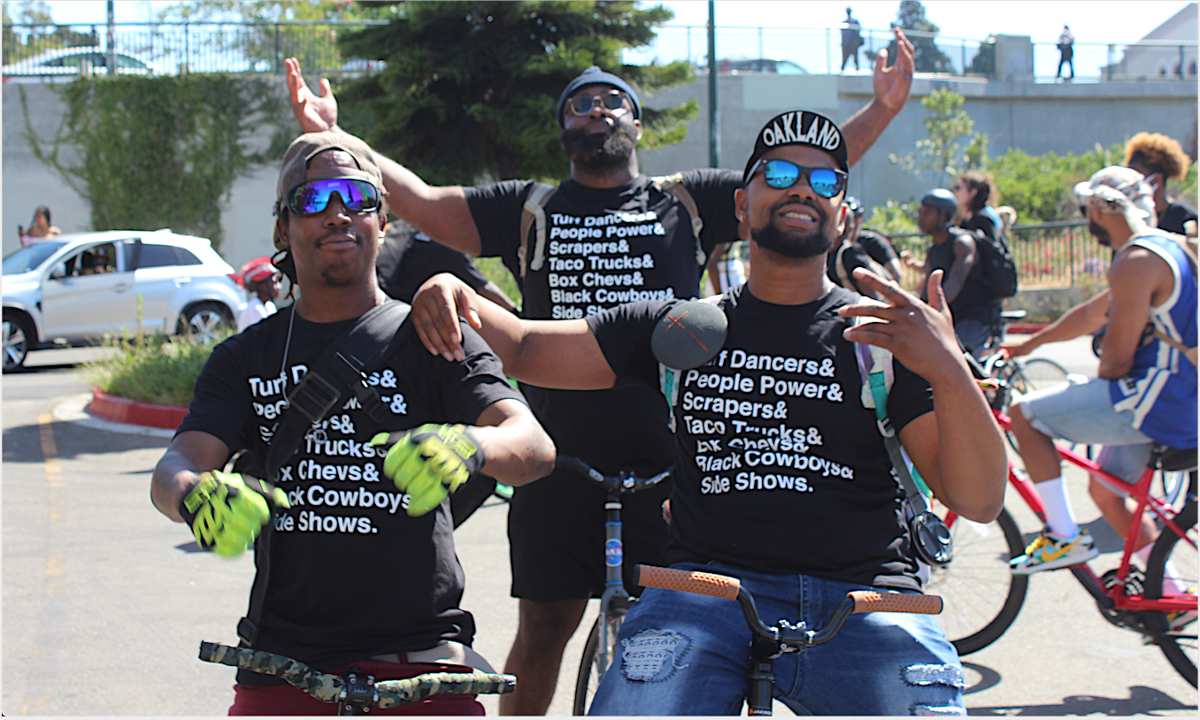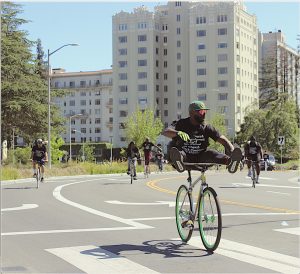Bay Area
Residents Celebrate 510 Day, an Oakland Holiday
The holiday started in 2016, when a group of long-term Oakland residents felt that, in the face of Black and Brown native Oaklanders being displaced through the city’s gentrification, a celebration of their cultures was necessary.


Demetrius Coats with his legs over his bike’s handlebars as he rides in the bike caravan around Lake Merritt at Oakland’s 510 Day celebration today.
Photo by Zack Haber on May 10.
Over 40 people gathered around Lake Merritt on Monday to celebrate 510 Day, an Oakland-based holiday that honors Black and Brown cultures of the city and their resilience against displacement each year on May 10.
“For us, it’s a protest and a party at the same time,” Leon Skyes, a Black Oakland native who helps organize 501 Day celebrations, told The Oakland Post. “Rather than being targeted, today we’re being celebrated.”
The holiday started in 2016, when a group of long-term Oakland residents felt that, in the face of Black and Brown native Oaklanders being displaced through the city’s gentrification, a celebration of their cultures was necessary. The 415 Day, a San Francisco holiday where residents gather every April 15th in Dolores Park to celebrate against and protest the removal of native SF families, was 510 Day’s inspiration. Both holidays get their name from their city’s respective telephone area codes.
In the years since the first 510 Day, several incidents at or near Lake Merritt have shown the area as a contested place where long-term Black and Brown residents’ acts of celebrating, music making, barbecuing, or simply existing have been under threat.
In the fall of 2016, a woman who lived near the lake called police on Aaron Davis, an 18-year-old Black Oakland native, to file a noise complaint about him playing his drum set. Soon after, Oaklanders rallied behind him with drums of their own to protest the complaint.
In mid-May of 2018, after a viral video showed white Oakland resident Jennifer Schulte calling police on Black Oakland resident Kenzie Smith for barbecuing near the lake, many Black Oakland residents came out to protest the incident by participating in the “BBQ’n While Black” celebration. Later that year, a white jogger threw a Black Oakland resident’s belongings in the lake. The city began evicting many Black and Brown homeless residents from the area and enforcing no camping rules in 2018 as well.
Since the start of the COVID-19 pandemic the lake has become a contested site for informal Black and Brown businesses after residents who live nearby have filed complaints against Lake Merritt vendors selling merchandise without permits.
“Gentrification has created a hostile environment for us where we can’t even just exist without getting the cops called on us,” Needa Bee, who helped start 510 Day and organize its Lake Merritt celebrations, told The Oakland Post.
Bee, also known as The Lumpia Lady, has lived in Oakland for about 30 years and has sold lumpia, a traditional Filipino food, for about 10 years at Lake Merritt. She served free lumpia to those who came to the 510 Day celebration.
The celebration included a bike and car caravan that circled the lake about one and a half times. Bikers, many of whom rode fixed gears and did tricks, lead the way. Demetrius Coleman put his legs up on his bike’s handle bars several times as he rode.
At one point, Zay Coleman sat entirely on one side of his bike, only using one pedal to move it as he biked down Grand Avenue with both his legs and his face pointing towards the lake. Cars that had signs attached to them supporting defunding the Oakland Police Department and against gentrification followed along, honked their horns loudly, and blared Oakland musicians like Too $hort. Motorcyclists rode along and revved their engines. Two roller skaters also joined the caravan.
After the caravan, participants gathered at the Lake Merritt Amphitheater to eat food and take photos while some of the bikers continued to do tricks. Neptune Jenkins stood on the frame of his bike while grabbing the front wheel, pushing and pulling it back and forth while continuing to balance. Signs honoring historical Oakland events and famous Oaklanders like basketball player Bill Russell, activists Elaine Brown, Bobby Seale, and Fred Korematsu, musician and dancer Kehlani, and rap groups Hieroglyphics and Digital Underground were lined up in a row at the amphitheater.
Nicole Lee, an Oakland native who helped organize the celebration, described 510 Day as a way to “assert joy at the same time that we’re protesting around Oakland natives and Oakland culture being displaced.”
The politics of 510 Day were present at the amphitheater, as organizers encouraged participants to sign a petition to be sent to City Council, Mayor Libby Schaaf and county and state leaders to support the #WeStillHere Oakland Platform which outlines nine demands including shelter for all and Oakland’s non-cooperation with Immigration and Customs Enforcement.
While people celebrated at the amphitheater with music and some drank alcohol and smoked cannabis, the celebration stayed calm, the crowd was not densely packed, and people left well before dark. Although in years past 510 Day in person celebrations included larger, dense crowds and live DJs spinning loud music, organizers intentionally kept this year’s in person celebrations low key as a precaution against spreading COVID-19. The organizers hosted a party on the internet later in the evening with local DJs Kleptic, AbelDee and DJ Fuze.
“While this isn’t physically the largest [510 Day celebration], this has been one of the best ones, just by the heart of the people, the will of the people, and the vibe,” Skyes told the 510 Day celebrators at the Lake Merritt amphitheater. He looks forward to hopefully returning next year with a larger in person party/protest.
Activism
Oakland Post: Week of July 24 – 30, 2024
The printed Weekly Edition of the Oakland Post: Week of July 24 – 30, 2024

To enlarge your view of this issue, use the slider, magnifying glass icon or full page icon in the lower right corner of the browser window. ![]()
Activism
Oakland Post: Week of July 17 -23, 2024
The printed Weekly Edition of the Oakland Post: Week of July 17 -23, 2024

To enlarge your view of this issue, use the slider, magnifying glass icon or full page icon in the lower right corner of the browser window. ![]()
Bay Area
Op-Ed Senate Bill 966 Threatens Health Equity in East Bay
My East Bay community is struggling to get by. A proposed State Senate bill would set us back even further. Serving the East Bay community has been my life’s work and my greatest joy. After leaving the Bay Area to complete my seminary, I returned home to found The Community Church in Oakland. From the outset of my time as the church’s pastor, I have been guided by the belief that my service must extend beyond the pulpit, because the health and economic needs of my community are so great. Our church has organized free food banks, COVID-19 testing clinics, and a housing and re-entry program for those suffering from addiction.

By Rev. Dr. Lawrence E. VanHook
Special to the Post
My East Bay community is struggling to get by. A proposed State Senate bill would set us back even further.
Serving the East Bay community has been my life’s work and my greatest joy. After leaving the Bay Area to complete my seminary, I returned home to found The Community Church in Oakland.
From the outset of my time as the church’s pastor, I have been guided by the belief that my service must extend beyond the pulpit, because the health and economic needs of my community are so great. Our church has organized free food banks, COVID-19 testing clinics, and a housing and re-entry program for those suffering from addiction.
Through my service, I have seen the challenges that our community members are facing. Oakland, my hometown, has the third-highest rate of violent crime in the state. The local economy is strained. Oakland-based businesses are leaving our community because they’re struggling to get ahead.
Both East and West Oakland has disproportionately high rates of respiratory illness due to heavy air pollution. While our local efforts have brought some aid to those in need, we are also counting on our state elected officials to help us address the systemic health disparities afflicting the community.
Chief among the health concerns of community members is having reliable and affordable access to prescription drugs. Equitable access to medications gives us the peace of mind that we can keep ourselves and our families healthy and safe. Our community should not have to choose between paying rent or purchasing prescriptions.
Unfortunately, rather than taking action to combat soaring prescription drug prices, some California lawmakers are pushing legislation that could raise patient costs at the pharmacy counter.
The Legislature is currently considering SB 966, a bill backed by special interests that would undercut the few tools we have to keep prescription drug costs contained, letting big drug companies increase their prices, profiting on the backs of working families – some of whom already live paycheck to paycheck.
SB 966 would target the fundamental programs through which small businesses, unions, and government health programs are able to offer their employees and members quality and affordable healthcare. Millions of Californians rely on these plans to obtain essential medications at the lowest-possible cost.
The bill would make it illegal for employers and unions to incentivize the administrators of their prescription drug plans to negotiate for the lowest possible cost for prescriptions. Right now, small businesses and unions can choose to pay these administrators more for taking on big drug companies and securing discounts – a choice that will be outlawed under this bill.
As a result, employers will have no leverage to stop big drug companies from setting sky-high prices, disproportionately impacting working families.
As these health costs quickly add up, employers will have little choice but to pass the increases down to their employees. That means California patients will see higher healthcare costs and co-pays.
From my perspective, most concerning is that the bill would exacerbate the health disparities impacting my community and other underserved populations. If SB 966 becomes law, the most vulnerable may be forced to skip prescription doses, stop filling their prescriptions, and avoid essential care.
By rejecting this cash grab by big drug companies, our state elected officials can send a clear message that they stand with the community, patients, and working families.
We cannot afford SB 966.
Rev. Dr. VanHook is the founder and pastor of The Community Church in Oakland and the founder of The Charis House, a re-entry facility for men recovering from alcohol and drug abuse.
-

 Arts and Culture3 weeks ago
Arts and Culture3 weeks agoRooted in Tradition: The Intricate History of Black Hair Braiding
-

 Bay Area4 weeks ago
Bay Area4 weeks ago“I Will Not Be Bullied,” Says Oakland Mayor Sheng Thao
-

 Bay Area2 weeks ago
Bay Area2 weeks agoPG&E Increases Rates While Bay Area Households Are Struggling to Stay Afloat
-

 Business3 weeks ago
Business3 weeks agoGov Newsom: Raising Fast Food Minimum Wage to $20 Pays Off as Jobs Multiply in Industry
-

 Activism4 weeks ago
Activism4 weeks agoOpponents of Mayor Sheng Thao Are Calling on Her to Resign Following FBI Raid
-

 Community1 week ago
Community1 week agoHundreds Come to Jehovah’s Witnesses’ Assembly Hall for Three-Day Program of ‘Good News’ in Fremont
-

 Bay Area2 weeks ago
Bay Area2 weeks agoJuneteenth Mass Shooting Suspect Charge with Multiple Counts of Felony Assault by Alameda County DA Pamela Price
-

 Activism4 weeks ago
Activism4 weeks agoOakland Coliseum Sale to AASEG: A Model for Community Development and Inclusion

















































